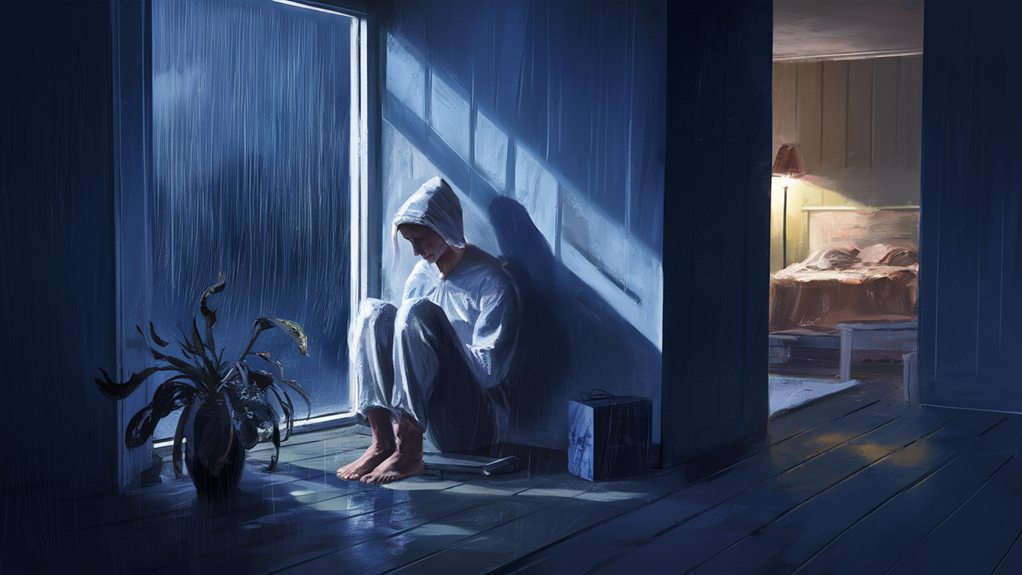Depression and suicidal thoughts can affect anyone, but you're not alone in this struggle. If you're experiencing changes in sleep, appetite, or social habits, or having thoughts about death, it's essential to reach out for help immediately. The National Suicide Prevention Lifeline (988) offers 24/7 support, and professional counselors are ready to listen without judgment. Warning signs often include giving away possessions, withdrawal from activities, and sudden mood changes. Remember, seeking help isn't a sign of weakness – it's a brave step toward healing. Understanding the signs and available resources can make all the difference in preventing suicide and managing depression.
Understanding Depression and Suicidal Behavior

Understanding Depression and Suicidal Behavior
Depression and suicidal thoughts can sneak up on you without warning, affecting people from all walks of life. When you're experiencing depression and suicide risk, your mind might feel clouded, and everyday tasks can become overwhelming.
You'll notice changes in your sleeping patterns, appetite, and the way you interact with others, which are important warning signs to recognize. These symptoms can often lead to a feeling of isolation, making it essential to understand the impact of depression on mental health.
Understanding these signs is vital for suicide prevention, and you don't have to face them alone. Mental health support for suicidal thoughts is readily available through counselors, therapists, and crisis hotlines that are staffed 24/7.
You might feel like no one understands what you're going through, but trained professionals can help you navigate these challenging emotions and develop coping strategies.
If you're noticing these feelings in yourself or others, it's important to take action quickly. Watch for withdrawal from activities, giving away possessions, or talking about feeling hopeless.
These behaviors often signal that someone needs immediate help. Remember, seeking support isn't a sign of weakness – it's actually one of the bravest steps you can take toward healing and recovery.
Warning Signs to Watch For
Recognizing the warning signs of suicidal behavior can make the difference between life and death. When it comes to preventing suicide, you'll want to watch for sudden changes in your loved one's behavior, mood, or daily routines. Recent research has shown that innovative therapy approaches and holistic treatments can greatly help those struggling with depression, which is often linked to suicidal thoughts and behaviors breakthroughs in medications.
Look for warning signs like giving away prized possessions, talking about death frequently, or withdrawing from friends and family.
As part of suicide awareness, you should pay close attention if someone you care about starts saying things like "I won't be around much longer" or "Everyone would be better off without me." Other red flags include sudden mood swings, increased alcohol or drug use, and dramatic changes in sleeping patterns.
You might notice they're showing less interest in activities they once enjoyed, or they've stopped making future plans.
If you observe these warning signs, don't ignore them or assume they'll pass. Watch for multiple signs occurring together, as this often indicates a more serious situation.
Risk Factors and Vulnerability

Certain life circumstances can markedly increase someone's vulnerability to suicidal thoughts and behaviors. You'll find that major life changes, such as divorce, job loss, or the death of a loved one, can considerably impact your emotional well-being and create heightened risk.
Implementing empowering strategies to manage these challenges can greatly improve your mental health. If you're dealing with chronic illness, chronic pain, or a recent trauma, you're also facing increased vulnerability.
Your personal history plays a vital role, too. If you've experienced abuse, struggled with substance use, or have a family history of suicide, you're working with additional risk factors that deserve attention and care.
Mental health conditions, particularly depression, bipolar disorder, and anxiety, can make you more susceptible to suicidal thoughts, especially when left untreated. Social factors, like isolation, bullying, or lack of support systems, can compound these risks.
You should know that belonging to certain demographics can also increase vulnerability, including being LGBTQ+, a military veteran, or living in rural areas with limited access to mental health resources.
Understanding these risk factors doesn't mean you're destined to struggle, but it does help you recognize when to seek support.
Crisis Support and Resources
Hope exists in every crisis, and immediate support is always within reach. If you're struggling with thoughts of suicide or severe depression, you'll find caring professionals available 24/7 through the National Suicide Prevention Lifeline, where you can call or text 988 to connect with trained counselors who want to help.
You're never alone in this journey, and there's no shame in reaching out for support.
Local crisis centers, mental health clinics, and emergency rooms are equipped to provide immediate assistance when you need it most. Your doctor, therapist, or school counselor can connect you with valuable resources, including support groups and specialized mental health services.
If you're more comfortable with digital support, you'll find several crisis intervention apps and websites that offer immediate chat features, coping tools, and safety planning resources.
Building a Safety Plan

A well-crafted safety plan serves as your personal roadmap through difficult moments, combining specific strategies and trusted contacts you can turn to when depression or suicidal thoughts become overwhelming.
You'll want to create this plan when you're feeling calm and clear-headed, making it easier to follow when emotions are intense.
Start by identifying your personal warning signs, such as isolating yourself, changes in sleep patterns, or racing thoughts.
Next, list healthy coping strategies you can use independently, like deep breathing exercises, going for a walk, or listening to calming music.
Then, write down people and places that help distract you from difficult thoughts, including friends, family members, or peaceful locations in your community.
Your safety plan should include contact information for at least three trusted people you can call during a crisis, as well as professional resources like your therapist or counselor.
Don't forget to add crisis hotline numbers and nearby emergency services.
Keep your plan easily accessible, perhaps saved on your phone or written in a small notebook you carry with you.
Mental Health Treatment Options
Treatment for depression and suicidal thoughts extends far beyond a one-size-fits-all approach, offering multiple paths toward healing and recovery.
You'll find that mental health professionals can help you develop a personalized treatment plan that fits your specific needs, experiences, and circumstances. Effective therapies for anxiety management, such as evidence-based treatments, can also be adapted to address symptoms of depression.
Working with trained professionals, you can explore various evidence-based treatments that have helped many people overcome depression and suicidal thoughts. These specialists will carefully evaluate your situation and might recommend a combination of approaches, including therapy, medication, or support groups.
- Individual therapy, where you'll work one-on-one with a therapist to identify triggers, develop coping strategies, and process difficult emotions
- Medication management with a psychiatrist, who can prescribe and monitor antidepressants or other medications that help regulate brain chemistry
- Group therapy sessions, which provide both professional guidance and peer support from others who understand what you're going through
You don't have to figure this out alone, and it's okay to try different treatment options until you find what works best for you.
Many people find that combining multiple approaches provides the most effective path to recovery.
Supporting Someone in Crisis

Recognizing signs of a mental health crisis in someone you care about can feel overwhelming, but knowing how to respond effectively could help save a life. When you notice someone struggling, it's important to stay calm and approach them with genuine concern, letting them know you're there to listen without judgment.
If someone shares thoughts of suicide, don't be afraid to ask direct questions about their plans, as talking about suicide won't increase the risk. You'll want to stay with them, remove any dangerous items, and help them contact crisis resources or emergency services.
Remember to take all threats seriously, even if they seem minor. You can support them by offering to help make appointments, drive them to get help, or simply sit with them while they call a crisis hotline.
It's essential to validate their feelings without minimizing their pain, using phrases like "I hear you" and "You're not alone in this." Don't promise to keep their suicidal thoughts secret, as getting professional help may be necessary to guarantee their safety.



